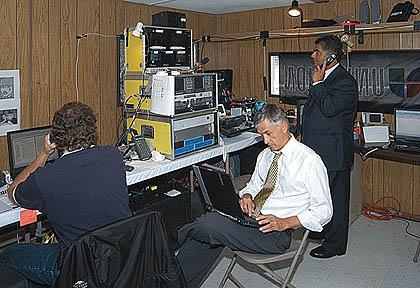


|
July 28, 2004
Front
Page
|
|
Rival Spanish-Language Networks
Battle for Hispanic Viewers in the U.S. They are mano a mano competitiors, using the Democratic and Republican conventions to show off their best stuff. Univision and Telemundo, the largest and most popular Spanish-language TV networks in Latin America and the United States, are focusing more on their American audience this week. They are convinced that Latino voters could play a decisive role in the coming U.S. election. Dominant Univision and the smaller Telemundo have come to Boston with their best journalists, producers and technicians. According to a recent survey by the Pew Hispanic Center/Kaiser Family Foundation, 72% of American Latinos are paying some attention to the presidential race. Latino-Americans include the nation’s fastest-growing immigrant group, and their votes will be critical in such swing states as Florida, Arizona, New Mexico, Colorado and Nevada. Univision’s Jorge Ramos, anchor of “Noticiero Univision,” is one of the most famous journalists among Latino viewers. He is leading a team of 35 people, coming from Miami to cover the convention. Telemundo’s Pedro Sevsec, also an important star, is part of a 12-person team here. “In my 18 years working for Univision, I have never seen such an important role for the Latinos in one election. We are in the position of defining who can be the next President of the U.S.,” said Ramos, who was born in Mexico and who started his peregrination to America in 1983 with a student visa. He since has won seven Emmys. Both Univision and Telemundo are focused on covering Latinos at the convention, who make up 11.3 percent of the 4,353 delegates, compared with 9 percent in 2000, according to DNC officials. Univision is deploying a team that is costing them, in Ramos’ words, four times more than the last election. Hot stories for both include coverage of Hispanic-American leaders Bill Richardson and Robert Menendez and such issues as Cuban relations, Latinos, health care, education, the economy, the war on Iraq and international terrorism. Univision is dominant among American’s 40 million Hispanics, but Telemundo has a new and powerful corporate parent. Telemundo is debuting here for the first time as a subsidiary of NBC, using the giant network’s technology and support. “We are in the skybox next to Tom Brokaw,” says Joe Peyronnin, the executive vice president of Telemundo Network News, who is well known within the television business for his 25 years at CBS. Peyronnin doesn’t speak "un poquito espanol," but it may not matter. “I don’t know Spanish, but I know about business," he says. Univision has its own ally, which will help it fend off the competition from Telemundo: a news-sharing agreement with CNN En Espanol, the only Spanish language news network that is on 24/7. Meanwhile, five Spanish-language newspapers are also busy covering the convention in Boston. El Diario La Prensa from New York and La Opinion from Los Angeles have a new partnership in Impremedia, which they hope will give them a competitive edge over the others. |
|
|
MediaNation
TM © 2004 University of Massachusetts Boston and
Nieman Foundation at Harvard University. Legal notice
